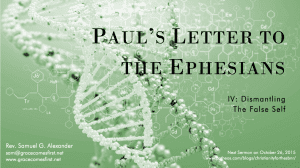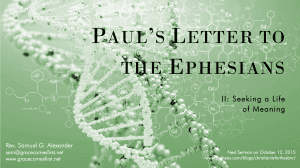Abstract
Building on the first sermon of the series, which claimed that the core of Christian faith – cross and resurrection – is descriptive of the evolutionary process, this sermon suggests how that might impact our theological language. It puts traditional understandings of the Doctrine of Salvation, the Doctrine of Sanctification and Eschatology side by side with the workings of an “evolutionary Christianity.”
A series disclaimer of sorts: There is a lot to be said for the traditional-mythic understanding of the faith. If that theological framework is working for you, that is OK with me. That said, it doesn’t work for a great many people in our culture; I’m among them, and that is why I am exploring other ways to describe our faith. I’m exploring language that is intelligible in our modern or post-modern context. I’m glad to dialogue with anyone about it, but if you find that I’m just annoying you, may I suggest you stop reading? I’m not writing to tick anyone off.
Evolution and Faith – Wake Up, Grow Up, Show Up (Audio – right click to download)
My text for the sermon this week is the same text as last week, but I’m just going to read one verse in the middle of the prologue to the Gospel of John – verse 12 of chapter 1.
But to all who received the logos, [this pattern or driving force in creation], to all who received him, who trusted in his name, he gave power to become children of God.
____________
1 Last week I spoke of the cross and the resurrection, the central motif of the Christian religion, as being descriptive of the process of evolution. A movement of death to life, but more than a movement from death to life, it’s from death to a new life, to something novel, something that’s unexpected, something that our imaginations cannot produce or predict. It comes out of nowhere, like when you put two hydrogen atoms and an oxygen atom together and you get water. We might have predicted that the atoms would stick together, but without having seen it before, I’m thinking we would not have predicted the property of flow.
Once single celled organisms had formed and were floating around in the midst of the oceans, would we have expected them to come together and form cooperative entities? We would not have predicted cooperation and we certainly would not have imagined those cooperatives becoming entities with each cell playing a specialized role. We would not have imagined the development of a brain with so many synapses firing, more than the grains of sands on the earth we’re told. Out of that came the another novel evolutionary event. The development of an entity that is self-consciousness. The universe created something that can see and love the universe and then even that evolves. Cross and resurrection: from old humanity to the new human being, is the way Paul put it.
So this movement from death to new life, from cross to resurrection, I said was descriptive of that evolutionary process. In fact, for me it is part of that evolutionary process. A number of people had questions about that and I thought it might be useful to put this idea up – side by side – with traditional understandings of Christian faith. To do that I’ll take a different approach to preaching than is my normal mode.
There was a gentleman in my first church named Les who used to get upset with me when I preached. He would tell me that the right way to preach is to use the three “tell’ums.” He suggested that the way to preach was to first tell the congregation what I’m going to tell them, then second tell them, then finally tell them what I told them. But I said to Les, “Yeah, but usually I want to sneak up on you and hit you over the head with the Gospel.” That was my normal mode of operation. But today, just for Les, the three tell’ums.
So first, we’re going to talk about how an evolutionary understanding of Christianity will sit with the Doctrine of Salvation, that is, the doctrine that describes how we are saved and what we are saved from. Then next I want to reflect on the Doctrine of Sanctification, that is the doctrine concerning how we are transformed by the power of God. Then finally I’m going to reflect on what scholars call eschatology, that is, the words we use to talk about the end times – Jesus’ second coming. Now I’ve told you what I’m going to tell you.
The Doctrine of Salvation. We are saved the tradition tells us, from something called sin. Often people think of sin as the bad things people do, but traditional Christian doctrine will say that it runs much deeper than that. Sin can be seen as an infection that so alters us that we cannot do the good we want to do. That’s how Paul puts it in the 7th chapter of Romans. So it’s an infection, something in the human condition that isn’t right and it runs deep. That is a problem because God is just and holy and God’s justice demands retribution, blood must be shed to balance the scales of justice when we break the law of God.
The stories of scripture suggest that there was a point in time, a point in history, when we were not infected by sin when we did not break the law of God. We were perfect, innocent, and whole, connected to God, but then we fell into this condition and so now we need to be saved from it. We need to be healed from this sin, this infection. So what does God do? Traditionally we understand that God, being a merciful God, instead of meting out punishment on us, the guilty, God sent his Son to accept that punishment on our behalf. His Son was crucified on our behalf. When Jesus dies, when his blood is shed, it’s not just Jesus that dies, it’s that fallen, infected humanity that is destroyed. But Jesus does not stay in the grave; the old humanity dies to be sure, but a new humanity, one free of sin, rises from the grave. And if we latch hold of that idea, if we trust that this is what God has done for us, then we are healed of our sin and live in the resurrected, abundant, eternal life of Christ.
If a person thinks that there is a God outside creation acting upon us, if one thinks that there was a point in history when humankind was perfect, if one thinks that blood has magical properties and can satisfy God’s desire for justice, then this way of formulating the Doctrine of Salvation makes sense. But I don’t think that and I would suggest that most in our society do not think that. Is there a way to understand the Doctrine of Salvation that will make more sense of our worldview? I think the answer to that question is, yes.
So, I do not hold to the underlying assumptions of the traditional Doctrine of Salvation, but I would have to agree that the human condition is disturbing. We went over this last week. We say, “I love you,” but we do not mean I love you, I will do whatever I can so that your life flourishes, instead all to often what we really mean is, “You fill my needs perfectly.” Society has built an unjust economic system. We are afraid that resources are scarce, that we won’t have enough and so we grab all that we can to make ourselves secure. But that’s a project with diminishing returns and it creates injustice until finally the trust that binds societies dissembles and it all comes crashing down. The human condition is troubling. We respond to violence in a way that escalate until human cruelty presents a horrifying spectacle.
The human condition is deeply troubling. If there’s no God from the outside who’s going to fix it, can we be saved? What would it mean to be saved? It means that we wake up. We wake up, wake up to the fact that we are not the sum of our biological drives, that this is NOT a static world in which we live; this is a dynamic, evolutionary world. It moves from one thing to another. It develops and it grows. God’s power can be seen in the impulse that drives this process forward. God’s power, the Logos of John, lives within us, expresses itself through us. When our eyes are opened to that fact, when we receive it and trust it, as John says, when our self-consciousness rises above the bondage of the human condition, well then we are saved.
Wake up; you are saved. You are a human being and as such you have what John calls, “power to become Children of God,” that is power to be an integral part of the process of evolution in this place. You have the power to change because the creative impulse that has driven creation forward lo these 13.7 billion years, expresses itself within you. The power of sin breaks when we wake up to that fact.
In both the traditional, and what I might call an evolutionary view of the Doctrine of Salvation, if we trust, if we wake up to God’s way in creation, we are no longer identified by the static condition of sin. In both cases we are free to live an abundant life, intimately connected to the presence of God.
That is who we are. This is our being, but it is not too difficult to recognize that this reality does not express itself in our lives as often as we’d like. That moves us to the Doctrine of Sanctification. In virtually every religious tradition there is this tension between being and becoming. Sanctification is about becoming who we are. In short we need to grow up. In a traditional Christian faith the Holy Spirit is given to us so that we can become who we are. This is what the Apostle Paul calls “working out our salvation.” That kind of language resonates for me, but often the traditional work of sanctification is done in the shadow of a wrathful and judging God. I just can’t get there.
It is true that there are consequences for actions, though to suggest a one to one correspondence stretches credulity beyond the breaking point. The process of evolution moves forward because some element or another is not working in harmony with creation. It is true that the old is destroyed in favor of the next step in evolution, and I can understand how those who thought the world was flat and has a dome over it that holds back the waters of heaven might interpret those things as the wrath of God. But surely we do not did not need to do so now. It’s a sermon for another time, but I think trying to grow up in the shadow of such a god is counter-productive. We grow up in the presence of a God whose creative power unfolds and expresses itself within and around us. We grow up in love, not in fear.
Wake up; Grow up; But to what end? We raise the question here of directionality and with it the question of purpose. These are the issues that eschatology seek to address. Traditionally Christians have spoken about the second coming of Christ – Jesus returns on a white horse, splitting open the heavens re-entering creation and bringing all things to their perfect close. The “new Jerusalem” descends from the heavens, everyone lives in harmony with God and with one another. The whole universe becomes one. That is where this is all going. It is a vision of hope, a statement of trust, one we use as we live our lives with that directionality in mind.
It’s actually a wonderful image. Do I think it will operate that way, Jesus on a white horse? No. But I do believe that creation is moving towards the moment when being and becoming are complete, when all things live in harmony. I emphasize that this is a statement of faith. It’s a conclusion that can’t be built on a foundation of verifiable evidence. Oh there is evidence that says it’s not a crazy notion – 13.7 billion years from the big bang to Shakespeare suggests directionality to me – but that does not constitute proof.
But when we live with that hope, with that directionality and purpose in mind, it means that we have to show up. The reality is that in that unity where all comes together in perfect harmony, you will have to be there. My friend Marc says, “God can’t get it done with you.” Each of us holds a unique profile in that one united reality joined together by the love of God. If you don’t show up, if you don’t play your unique role, if you do not live into your purpose and being, we can’t get it done. You are that important, period.
Wake up. You are a child of God; you are not bound and limited by a static human condition. The power that drives our evolving universe is expressing itself through you. Grow up. Let that reality take hold so that you evolve, so that your life is transformed that the creative love of God. Show up. Each and every one of you is an expression of that love. If you do not play your unique role in this evolving project called life, we cannot come together in perfect harmony. But consider this, as you do show up, you are an integral part of the beauty that opens our hearts and makes us whole.
[1] I thank my friend Dr. Marc Gafni for this three part aphorism, which I suppose may not even be his, but much more for the content of his Unique Self teaching.











